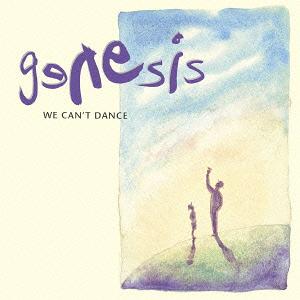The lyrics are also less vague, encroaching even more on social commentary, which frankly, had never been their strong suit. Wisely, the album begins with the brooding “No Son Of Mine”; while it does address domestic turmoil, the darker tone evokes good memories of the “Mama” album. “Jesus He Knows Me” is mildly catchy, but overtly skewers televangelism, and evokes uncomfortable memories of “Illegal Alien” or “Anything She Does”. But just to throw people off track, “Driving The Last Spike” is their first lengthy historical epic since the mid-‘70s, but turns toward a more contemporary sound over its ten minutes, despite the 19th-century subject matter.
While not specifically the title track, “I Can’t Dance” pretty much unravels any attempt to take the band seriously, with both the lyrics and literal video making fun of the then-current trend in music videos and soda commercials, despite their own participation and the fact that Phil had already done it quite well in the clip for “Don’t Lose My Number”. “Never A Time” is the requisite ballad, and a nice one, with echoes of adult contemporary Eric Clapton and far enough away from “People Get Ready” to keep from being sued. Then “Dreaming While You Sleep” spends far too long with a drum machine and bluesy noodling to get its point across (to wit: hit-and-run drivers will be cursed with guilt forevermore).
While Mike Rutherford’s Rickenbacker 12-string reappears after too long a wait, the mild samba rhythm and upbeat tone of “Tell Me Why” brings forth only more hand-wringing over social injustice. “Living Forever” provides an ironic contrast in its resistance to being told what to do and how to live, carried by a truly infectious backing and an extended ending that, again, recalls the mid-’70s. Despite being a single, “Hold On My Heart” is the “In Too Deep” of the album, and redundant after “Never A Time”.
As if “Tell Me Why” wasn’t enough, “Way Of The World” asks more child’s questions about why modern life is just so hard and cruel. And maybe we’re just sentimental, but “Since I Lost You” works despite its wrenching delivery and inspiration (the recent death of Eric Clapton’s young son, with some Slowhand-style leads to boot). So it really takes balls to end with yet another ten-minute epic, but “Fading Lights” is much preferable to “Driving The Last Spike”, and we still expect the chorus to go into “Ripples”. Tony’s extended solo in the middle is worthy of his best, and hindsight has brought a certain poignancy to the track, being the last studio track this version of the band released.
Basically, We Can’t Dance is a long and tiring listen; delete a few of the songs and cut others short and there’s the possibility of a strong set here—slight, but possible. The converted didn’t care, and promptly bought millions of copies and almost as many concert tickets, which in turn sold more copies of the album.
Genesis We Can’t Dance (1991)—2½

After I heard my then-local station debut “No Son of Mine”, the DJ said, “Where are the balls?”. Despite the 80’s synths and some Phil Collins sappiness, the preceding three albums retained some edge. However, the sound here is the aural equivalent of oatmeal that has way too much sugar in it, trying to compensate for being mushy and flavorless. The album is, I agree, way too long. “Dreaming While You Sleep” is OK, I suppose. I really like “Driving the Last Spike”. Collins’s lyrics are excellent. Musically, it’s the one track where the band’s new approach comes together. But you can that song on "The Way We Walk". Everything else sounds smarmy and tired. The band’s old chemistry was fading out, but they didn’t seem to notice
ReplyDelete